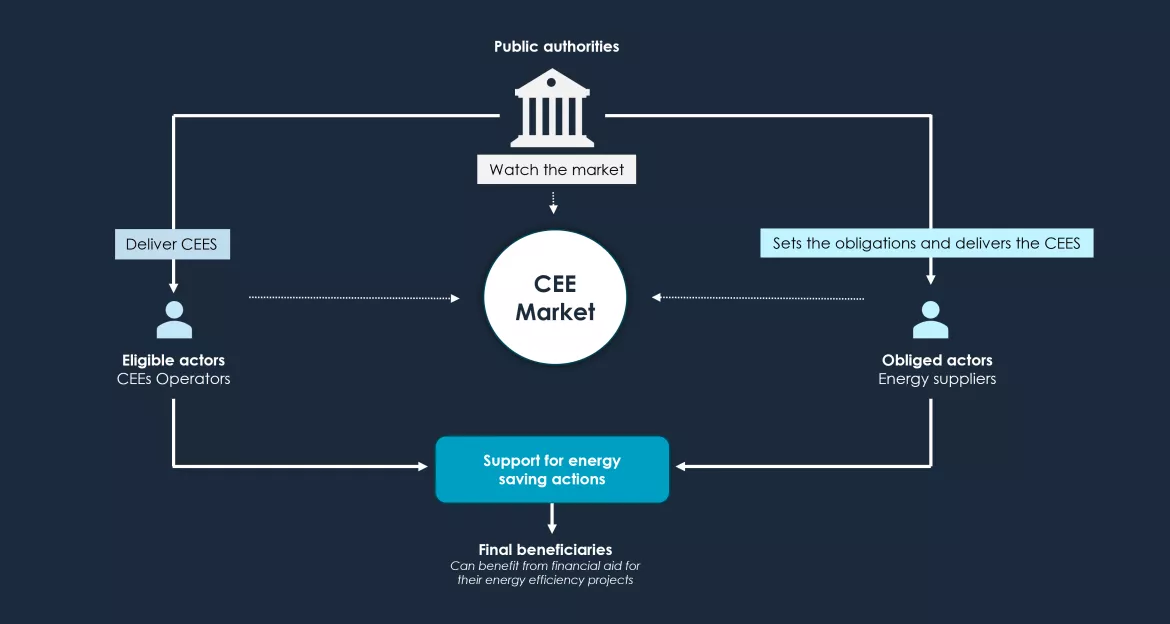Small players with innovative ideas often struggle with the consequences of rapid growth. Here's how Avertim helped an energy-saving project financing business to unlock their potential.
Scaling for sustainability : the energy transition challenge
Energy transition from fossil-based systems to renewable sources represents a major challenge for our society.
In order to tackle it, large changes are being made at high levels. National and European directives have been launched across many topics, including electric cars, smart grids, renewable power generation, battery production and building insulation. But the success of this transition depends not just on legislation and industry giants but also on a dynamic and diverse ecosystem of small players and SMEs.
To meet the challenges of energy transition successfully and on an ongoing basis, theses small-scale players must be able to professionalise and industrialise.
Supporting small businesses : A case study in the Energy Savings Certificate Market
Avertim recently helped a struggling French company, operating in the Energy Savings Certificate (CEE) market, to scale and standardise operations with Business Process Management (BPM) and Operational Excellence methodologies (OpEx).
CEEs are an energy saving project financing solution. The CEE mechanism was created in France to make carbon-producing actors ("Obliged Actors") finance energy saving projects by using an intermediary market: the CEE market.
There are four groups involved :
- Public authorities : They are setting the obligations, delivering certificates and watch the market;
- Obliged actors: They must obtain a CEE quota set by the government;
- Eligible actors: They are compiling the files to obtain CEEs ;
- Beneficiary actors: They are financing their project by setting up CEEs.

Our client's issues stemmed from the fact that it was a small player (100 employees) which had grown too quickly in a niche market. Despite good profitability (turnover: 100M€, net profit: 15M€), the company had fundamental problems rationalising their increased activity:
- There were no standard processes in place, roles and responsabilities were unclear;
- It was difficult to manage the production due to the lack of data quality;
- The cost of non-quality was high, with a shortfall of +/- 3M€;
- There was a very low employee retention rate (~25% turnover/year).
While it's often thought that BPM and OpEx strategies are resource-intensive and useful only for larger corporations, these methodologies are also highly beneficial and applicable at smaller scales.

Avertim applied Business BPM and OpEx methodologies in this case to help our SME client to industrialise the processes and solve the fundamental problems. As a result, errors and uncertainty were reduced, unlocking the true potential of the business:
- All the production processes are modelled and under the responsibility of the Process Owner;
- Roles and responsibilities are strictly framed by IT systems, with differentiated profiles according to business needs;
- Mistake -proof systems are in place to eliminate errors as soon as possible;
- All the production is now tracked by individual and collective action logs allowing production to be managed as accurately as possible.
Some key resulting benefits are already visible in the business:
- All production processes are standardised, roles and responsibilities clearly established and understood throughout the company;
- Data quality has significantly improved, due to mandatory data entry and validation of the data with mistake proofing systems;
- The non-quality rate has dropped by 30%.
From microbusiness to multinational: the universal benefits of BPM and OpEx
Energy transition presents diverse opportunities for innovation and shaping the future is not exclusive domain of large players. Smaller and agile entities have a unique ability to drive transformation due to their capacity for quick adaptation and niche targeting but unlocking their true potential can be difficult. BPM and OpEx methodologies can serve as critical enabler, allowing small players to industrialise and scale effectively.

The principals of BPM and OpEx are universally applicable and can be successfully employed by any company, regardless of its size, to bring in a new era of efficiency and reliability
Unlocking sustainable energy transition potential
BPM and OpEx methodologies are not solely for large players; these methodologies can the key , small players need to unlock their potential, deliver superior value, and really make a difference. Working on this energy-saving project financing case underlined the key role that BPM and OpEx can play in empowering smaller entities to overcome their challenges and fully contribute to this global mission.
Is your business facing roadblocks on its way for a sustainable future? Avertim invite small players to contact us to explore this transformation journey together.
We look forward to supporting you in achieving ongoing operational excellence.


